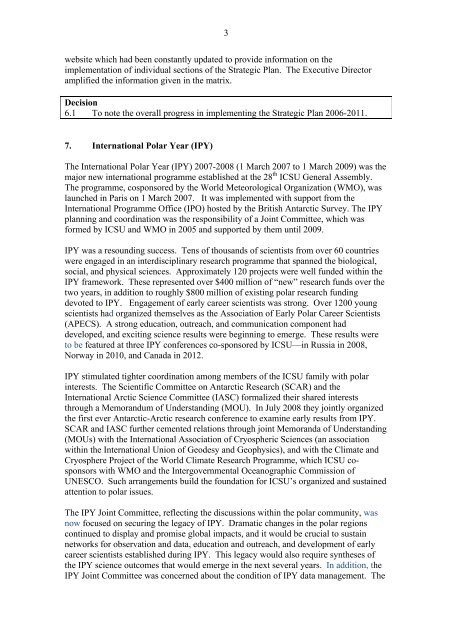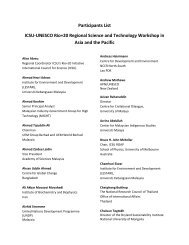DECISIONS 29th GENERAL ASSEMBLY - International Council for ...
DECISIONS 29th GENERAL ASSEMBLY - International Council for ...
DECISIONS 29th GENERAL ASSEMBLY - International Council for ...
You also want an ePaper? Increase the reach of your titles
YUMPU automatically turns print PDFs into web optimized ePapers that Google loves.
website which had been constantly updated to provide in<strong>for</strong>mation on the<br />
implementation of individual sections of the Strategic Plan. The Executive Director<br />
amplified the in<strong>for</strong>mation given in the matrix.<br />
Decision<br />
6.1 To note the overall progress in implementing the Strategic Plan 2006-2011.<br />
7. <strong>International</strong> Polar Year (IPY)<br />
3<br />
The <strong>International</strong> Polar Year (IPY) 2007-2008 (1 March 2007 to 1 March 2009) was the<br />
major new international programme established at the 28 th ICSU General Assembly.<br />
The programme, cosponsored by the World Meteorological Organization (WMO), was<br />
launched in Paris on 1 March 2007. It was implemented with support from the<br />
<strong>International</strong> Programme Office (IPO) hosted by the British Antarctic Survey. The IPY<br />
planning and coordination was the responsibility of a Joint Committee, which was<br />
<strong>for</strong>med by ICSU and WMO in 2005 and supported by them until 2009.<br />
IPY was a resounding success. Tens of thousands of scientists from over 60 countries<br />
were engaged in an interdisciplinary research programme that spanned the biological,<br />
social, and physical sciences. Approximately 120 projects were well funded within the<br />
IPY framework. These represented over $400 million of “new” research funds over the<br />
two years, in addition to roughly $800 million of existing polar research funding<br />
devoted to IPY. Engagement of early career scientists was strong. Over 1200 young<br />
scientists had organized themselves as the Association of Early Polar Career Scientists<br />
(APECS). A strong education, outreach, and communication component had<br />
developed, and exciting science results were beginning to emerge. These results were<br />
to be featured at three IPY conferences co-sponsored by ICSU—in Russia in 2008,<br />
Norway in 2010, and Canada in 2012.<br />
IPY stimulated tighter coordination among members of the ICSU family with polar<br />
interests. The Scientific Committee on Antarctic Research (SCAR) and the<br />
<strong>International</strong> Arctic Science Committee (IASC) <strong>for</strong>malized their shared interests<br />
through a Memorandum of Understanding (MOU). In July 2008 they jointly organized<br />
the first ever Antarctic-Arctic research conference to examine early results from IPY.<br />
SCAR and IASC further cemented relations through joint Memoranda of Understanding<br />
(MOUs) with the <strong>International</strong> Association of Cryospheric Sciences (an association<br />
within the <strong>International</strong> Union of Geodesy and Geophysics), and with the Climate and<br />
Cryosphere Project of the World Climate Research Programme, which ICSU cosponsors<br />
with WMO and the Intergovernmental Oceanographic Commission of<br />
UNESCO. Such arrangements build the foundation <strong>for</strong> ICSU’s organized and sustained<br />
attention to polar issues.<br />
The IPY Joint Committee, reflecting the discussions within the polar community, was<br />
now focused on securing the legacy of IPY. Dramatic changes in the polar regions<br />
continued to display and promise global impacts, and it would be crucial to sustain<br />
networks <strong>for</strong> observation and data, education and outreach, and development of early<br />
career scientists established during IPY. This legacy would also require syntheses of<br />
the IPY science outcomes that would emerge in the next several years. In addition, the<br />
IPY Joint Committee was concerned about the condition of IPY data management. The




